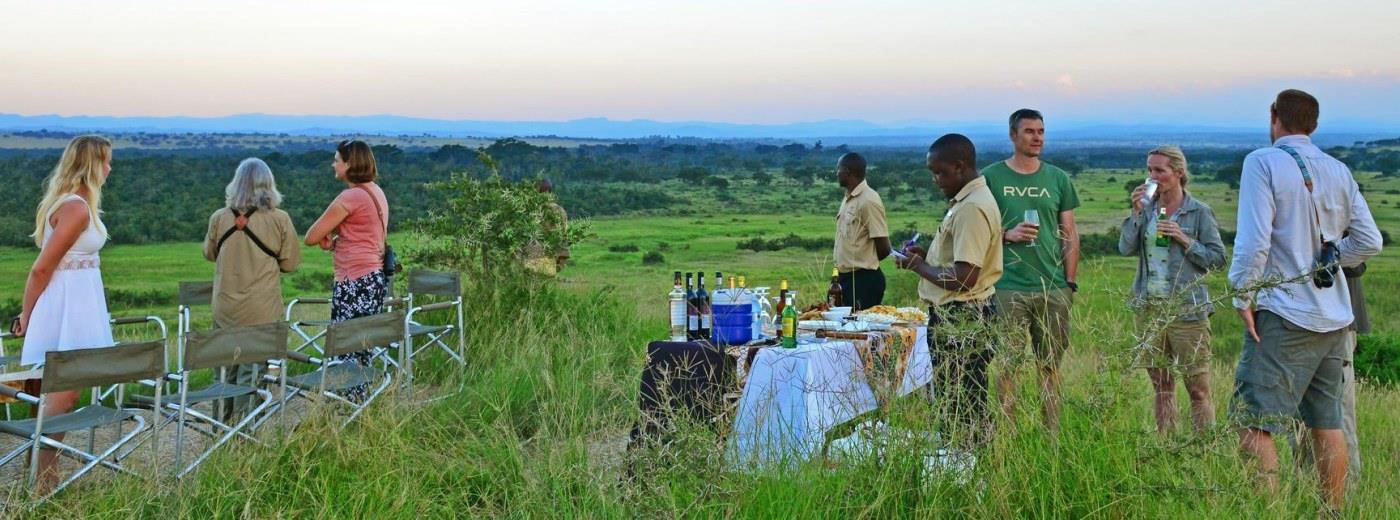All you need to know for your holiday to Uganda
Visa Requirements
Latest Travel Updates
For up-to-date travel information from the UK government, please check:
UK Government Advice: www.gov.uk/foreign-travel-advice/uganda
Normally, all passport holders must obtain a visa to enter Uganda when travelling as a tourist. The visa types available are Single Entry Visa or Multiple Entry Visa. Visas will not be issued on arrival.
Visas can ONLY be obtained online by going to https://www.visas.immigration.go.ug. You are required to upload clear copies of your current passport, your Yellow Fever Certificate, and a passport photo. On the application form, you are required to enter the ‘Contact in Uganda’ - please contact your Travel Butlers consultant for these details.
Upon approval of the visa application, travellers will receive an email notification with an approval letter as an attachment - travellers need to download and print the approval letter and present on arrival into Uganda. Please note that the online visa is only valid for 3 months from date of issue, so please plan your online application accordingly.
The current cost of the visa is:
Single Entry is USD 50 per person (subject to change)
All online payments may be subjected to a 3% surcharge fee.
Your passport should be valid for a minimum period of 6 months from the date of entry into Uganda and have sufficient blank pages for the Uganda visa and entry/exit stamps (at least 2).
Please note: We do NOT advise getting the East Africa Tourist Visa if your trip also includes Rwanda and/or Kenya as this can cause problems at point of entry.
IMPORTANT: Plastic bags are banned in Uganda. Arriving visitors are requested to avoid bring plastic bags into the country - this includes in suitcases and carry-on hand luggage.
Please check hand luggage before disembarking and any plastic bags (including plastic duty-free shopping bags and the transparent plastic bags that some airlines require passengers to use for keeping liquids, cosmetics, etc) should be left in the plane.
Ziploc bags that are specifically used to carry toiletries will be permitted as they are expected to remain in the permanent possession of visitors and are not expected to be disposed in the country.
PLEASE NOTE: Countries can change their entry requirements at any time. Travel Butlers try to ensure that the information displayed here is correct, but the onus remains with the traveller to verify the information with the relevant High Commission or Embassy and ensure that they can comply with the applicable entry requirements.
Medical Considerations
You are advised to contact your doctor or clinic around 4-8 weeks before your trip to check whether you need any vaccinations and to get their professional medical advice regarding travel to Uganda.
To help prevent diarrhoea, avoid tap water – drink only bottled water and use bottled water for tooth brushing, and avoid ice made with tap water – and only eat fruit or vegetables that are cooked or can be peeled.
To help avoid heatstroke, drink plenty of bottled water/fluids, and keep out of the midday sun.
Uganda falls into the yellow fever region in Africa. It is imperative for all travellers to obtain a yellow fever vaccination no less than 10 days prior to travel. A valid yellow fever certificate is required for all travellers over 9 months old. Your country of origin and other African countries including South Africa and Tanzania will also deny re-entry without the vaccination, after having visited a country with yellow fever. If your doctor advises that it is not safe for you to have the vaccination then you should obtain a medical waiver and travel with that document instead.
There is a risk of malaria in all areas of Uganda - check with your doctor about suitable antimalarial tablets. Dengue fever can also be transmitted via mosquito bites. Try to avoid mosquito bites wherever possible - wear loose long-sleeved clothing and trousers, and use a repellent on clothing and exposed skin.
Tsetse flies are found in certain woodland areas or in forested areas along riverbanks, and also around waterholes. There have been some cases of sleeping sickness occurring after a tsetse fly bite, although these are mainly amongst farmers and other locals who have repeated exposure to bites. However, the fly can still deliver a painful bite, so it is advisable to take necessary precautions - don't wear dark colours, especially black and blue (including denim), wear long-sleeved clothing and trousers, and avoid bushes during the hottest part of the day.
Mountain gorillas and chimpanzees are highly susceptible to human diseases including flu and colds. If you are participating in a gorilla/chimp trek then you need to be free of any visibly contagious diseases and this is checked at the start of the trek by the Park Authorities. If they are in any doubt about your condition, they reserve the right to prevent you from continuing on the trek. If you feel ill, please inform your guide as soon as possible, and he will seek advice as to the best way to manage the situation.
language and people
The official language is English, although many other languages are spoken. There are about 65 ethnic groups, and each have their own distinct culture and often with their own language. The country's most ancient inhabitants are the Batwa and Bambutui Pygmies - the hunter-gatherer communities that once occupied the forests in the southwest of the country.
We would ask that all travellers are respectful of the local culture as follows:
Same sex activity is illegal and not tolerated in Uganda's conservative society. Whilst everyone is of course entitled to their own sexual preferences and gender identity, we would advise all clients of the LGBT+ community to refrain from public displays of affection (including kissing and holding hands) and to be as discrete as possible about their relationship. On 30 May 2023 an anti-homosexuality act was brought into law in Uganda which includes harsh prison sentences, and the death penalty in some cases, for same sex sexual activity and also for supporting or promotion of LGBT+ rights. Members of the LGBT+ community or those who are perceived to be LGBT+ should be aware that they could see an increase in cases of harassment, imprisonment, blackmail and violence from people who view the law as justification for attacks.
Smoking is prohibited in all public places, workplaces, transport and other outdoor places within 50 metres of a public place. Electronic cigarettes and shisha (water-pipe tobacco) are banned. There are penalties including fines and/or imprisonment.
Don’t take photos of military, official or diplomatic sites, including Owen Falls Dam at the source of the Nile near Jinja. If you are taking photographs of people, ask their permission first.
It is an offence for anyone, including children, to dress in military style clothing. This includes clothing with marks, insignia and accessories associated with the Ugandan military, camouflage clothing and red berets. The offence carries a maximum sentence of life imprisonment when convicted.
You may be stopped and asked for ID documents by officials. Carry a copy of the personal details page of your passport (the page with your photograph) with you at all times.
On 22 May 2019 it became an offence punishable by a prison sentence and/or a fine to offer money, food or clothing to children living on the streets in Kampala.
currency
The currency is the Uganda Shilling.
US Dollars cash is the preferred option to bring when travelling to Uganda however. USD bills produced before 2013 as well as damaged bills are generally not accepted.
ATM machines are limited to major cities and may sometimes fail to dispense cash.
Payment for services by credit card can only be done by VISA card or MASTERCARD in some places. Only large hotels generally accept this means of payment.
It is advisable not to carry excessive amounts of money, leave excess money in a room safe if out on a day trip or wear a concealed travel wallet/belt.
climate
You can read more about the climate in our guide to the best time to visit Uganda.
phone coverage
The international dialling code for Uganda is +256.
electricity
240 volts British Standard, generally through 3 pin square plugs.
Some lodges and camps have power only at certain times of the day, and in some charging facilities are centralised. You will need your own charger.
In lodges/camps utilising solar power systems, the amount of power available for charging often depends on how sunny the weather has been and how busy the lodge is with charging equipment, so whilst they will always try to assist, continuous charging cannot be guaranteed at all times to be available.
Use of specialized breathing machines, hair dryers, curling tongs, shavers and other electrical equipment is possible at hotels in towns and at lodges with large generator power back up systems but generally not possible at solar powered lodges.
time zone
Uganda Standard Time is 3 hours ahead of Greenwich Mean Time (GMT+3).
Driving
While travelling through Uganda, you will be mostly on tarred roads and they are in reasonably good condition by African standards. There may be some VERY LONG days in the vehicle, but the interesting and diverse scenery generally makes up for it!
There are however, some really bad sections of dirt road, especially in the more mountainous areas. In these areas travel will be slower, quite bumpy and there could be a lot of dust experienced en-route.
The safari vehicles you will be travelling in are customised 4x4 vehicles (mainly Toyota Land Cruisers) which have been converted for local conditions - they seat between 4-7 people, depending on the seating configuration and have opening roof hatches for optimal game viewing. They are a little slower on the road than a saloon vehicle or a smaller 'family' 4x4 and do not have air conditioning. Your safari vehicle is generally used throughout the safari for travelling between destinations as well as for game drives and other activities at the lodges and within the National Parks.
We do not recommend people hire a car and drive themselves through Uganda.

